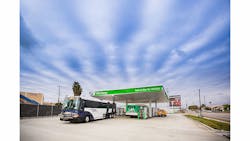Public transit is the backbone of a sustainable community. The American Public Transportation Association (APTA) reported that in 2013 a record 10.7 billion trips were taken on public transportation, the highest ridership in 57 years. These are the trips that help communities thrive and we’re seeing more of these trips being made on increasingly cleaner fuels. As America’s cities depend more heavily on public transit it is imperative we meet this rising demand sustainably.
A natural way to accomplish this is through the use of renewable fuels. Each year the 27 million passengers of The city of Los Angeles Department of Transportation (LA DOT) ride in buses fueled by renewable natural gas called Redeem. This fuel can slash GHG emissions by as much as 90 percent compared to gasoline and diesel, and is derived entirely from organic waste such as captured methane emitted from landfills.
Landfill methane capture has long been a priority for the U.S. Environmental Protection Agency (EPA) who asserts that municipal solid waste landfills are the third-largest source of human-related methane emissions in the United States and, “…represents a lost opportunity to capture and use a significant energy resource.” One year ago we launched the first commercially-available renewable natural gas called “Redeem" which is derived from landfill methane and other organic waste streams. We’ve seen a growing number of transit agencies such as LA DOT take advantage of this 100 percent renewable fuel to power its transit buses. This is sustainability in action: a city’s refuse used to fuel the buses moving its citizens.
Redeem is derived from biogenic methane, or methane that is naturally generated by the decomposition of organic waste collected at landfills, waste water treatment plants and agricultural operations. When we capture and use this methane as a vehicle fuel rather than allowing it to escape into the atmosphere, it can actually result in a negative carbon footprint. As an example, a fleet that consumes 1,000,000 gallons of gasoline per year can reduce their greenhouse gas emissions by approximately 9,700 metric tons by switching to Redeem, which is the equivalent of taking 1,940 passenger cars off the road.
Everyone can and should take part in building sustainable communities. Walking, riding a bike or taking public transit all have tremendously positive impacts on the air we breathe. Communities and transit agencies continue to provide innovative green transportation options. Clean Energy is regularly adding additional landfill methane sources and Redeem sourced from other organic waste streams to its roster of supply sources which means we can provide even more Redeem renewable natural gas to fleets. Our hope is that communities can get involved with the cleanest fuel commercially available simply by riding the bus.
Harrison Clay is president of Clean Energy’s renewable fuels division
About the Author

Harrison Clay
President, renewable fuels division, Clean Energy
Harrison Clay is president of Clean Energy’s renewable fuels division
